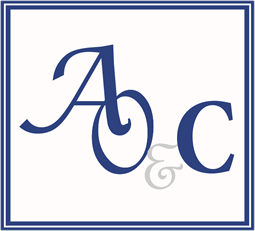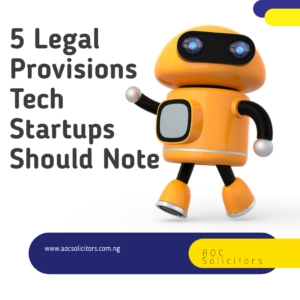With the advent of the 21st Century, came the technological age in which more and more transactions have become digitized globally. In fact, the world’s richest like Jeff Bezos, Elon Musk and Bill Gates have built their enormous fortunes around technological startups. A tech startup has been defined as a company whose purpose is to bring technology products or services to market. These companies deliver new technology products or services or deliver existing technology products or services in new ways.
These technological startups are beginning to emerge in Nigeria with popular examples such as Konga, Flutterwave, Taxify, Paystack, etc. revolutionizing everyday activities. Interestingly, even traditional non-tech based companies are beginning to leverage on technology for things like ecommerce, digital marketing, etc. As these companies continue to rise rapidly, it is crucial that proper understanding is acquired as to the legal provisions regulating the creation and operation of new tech companies. Some of such provisions will be discussed subsequently.
- Company Registration Laws
The very first provision to be aware of is the Companies and Allied Matters Act 2020. To provide commercial services (including e-commerce), the Corporate Affairs Commission requires that such persons register the entity under the Companies and Allied Matters Act. The type business structure chosen will depend on size, financial capacity, etc.S.18 (2) of the new CAMA now makes it possible to establish a private company with only one (1) member or shareholder.
- Intellectual Property Laws
Trademarks are images, logos, pictures, symbols, names, signs, designs, colors, sounds and jingles etc. which distinguish a product or service from others. By registering trademarks under TheTrade Marks Act., the owner of the registered trademark retains exclusive right of use and can institute a legal action against anybody who infringes on this right. Although a trademark cannot protect software, it may be used to protect and secure exclusive right to the software’s brand name, logo and slogan, i.e. software titles.
The Nigerian Copyright Act (NCA)classifies computer programmes (also referred to as software) as literary works which are eligible for copyright protection.Copyright protects the unique expression of a software programmeas described in the source and object codes providedit is his original work and has been fixed in definite medium of expression.
Software can also be protected under the Patent and Design Act in Nigeria, if it satisfies the basic requirements of patentability. Unlike copyright which protects software codes, patent protects the invention including the method and processes used in developing the software, once they have been fixed in a tangible format.Patentability of software is highly debated in Nigeria and copyright is presumed to be the most suitable form of protection due to the broad protection which it affords.
- Taxation Laws
The federal government, through the establishment of the Nigerian Investment Promotion Commission (NIPC) released guidelines for pioneer status incentives, which include, among other things:
- A three-year tax holiday from the initial stage
- Ten per cent withholding tax would not be deducted from dividends paid to company shareholders
One of the provisions in the Finance Bill 2019 is that firms with an annual turnover of less than ₦25 million ($68,500) do not have to pay CIT as required by the federal government.
Under Nigerian Law, there is also a tax levied on ICT companies called the Information Technology Tax. This tax is payable by specified companies (GSM service providers and all telecommunications companies, cyber companies and internet providers, pension managers and pension related companies, banks and other financial institutions, and insurance companies) who have an annual turnover of One Hundred Million Naira (N100, 000,000). The companies are to pay a levy of one per cent (1%) of their annual profit before tax to the National Information Technology Development Fund (“NITD Fund”). This tax when paid is tax deductible for company income tax purposes.
- Data Protection Laws
The NITDA Act empowers the National Information and Technology Agency (NITDA) to issue guidelines to cater for electronic governance and monitoring the use of electronic data exchange. Deriving from this provision, NITDA then developed and issued the Nigeria Data Protection Regulation 2019.
The Cybercrimes (Prohibition, Prevention, etc.) Act criminalizes data privacy breaches. It prescribes that anyone or service provider in possession of any person’s personal data shall take appropriate measures to safeguard such data.
The fundamental purpose of the CPPA is to establish a framework for the prohibition, prevention, detection, prosecution and punishment of cybercrimes in Nigeria. It imposes an obligation on mobile networks; computer and communications service providers to store and retain subscriber information for a period of two years.
- Acquisition and Transfer Laws
The NOTAP Act Cap N62 Laws of the Federation 2007 as well as the Revised Guidelines made thereunder provide the regulatory framework for the regulation of transfer of technology and/or expertise between offshore service providers and Nigerian companies.NOTAP registers technology transfer agreement in the following sectors:
- Manufacturing
- Information and Communication Technology (ICT)
- Finance & Insurance
- Hotels and Restaurant
- Oil and Gas
- Civil Construction
- Agriculture/Forestry
- Transport & Logistics
- Franchising
- Power and Energy
- Mining & Quarry
This Act established the National Office of Technology Acquisition and Promotion (NOTAP), which facilitates the flow of foreign technology into Nigeria. NOTAP also registers all contracts for the transfer of technology to Nigerian partners and seeks to promote locally generated technologies.
The NOTAP Act specifies the types of agreements that must be registered with NOTAP. These include the use of trademarks, the right to use patented inventions, and the supply of technical expertise, engineering and machinery.
Conclusion
It is important that all Tech startups before commencing operations go through all relevant legal provisions such as the ones mentioned above in other to comply with the law as well as avoid civil liability or in some cases criminal charges for breaching any of the given regulations.
References
A Business Owner’s Legal Guide to Tech Startups in Nigeria. (2020, September 14).Legal Services Blog.https://legalservices.ng/a-business-owners-legal-guide-to-tech-startups-in-nigeria
Scott, B. (2019, July 29). Nigeria: Intellectual Property Protection for Software Rights in Nigeria. S.P.A. Ajibade& Co.https://www.mondaq.com/nigeria/trademark/830390/intellectual-property-protection-for-software-rights-in-nigeria
CAMA 2020: What benefits for startups and MSMEs? (2020, September 16). Techpoint. Africa. https://techpoint.africa/2020/09/16/cama-2020-what-benefits-for-startups-and-msmes/
Paul, E. (2020, January 7) Early-stage startups will no longer have to pay tax, if Nigeria’s Finance Bill is passed into law. Techpoint.Africa. https://techpoint.africa/2020/01/07/nigerias-finance-bill-tax/
Ololuo, F. (2020, February19).Nigeria: Data Privacy and Protection Under The Nigerian Law. S.P.A. Ajibade& Co. https://www.mondaq.com/nigeria/privacy-protection/895320/data-privacy-and-protection-under-the-nigerian-law
Regulatory Regimes and the Ease of Doing Business in Nigeria. (2016, January21). Banwo&Ighodalo.https://www.banwo-ighodalo.com/grey-matter/regulatory-regimes-and-the-ease-of-doing-business-in-nigeria-1?leaf=3
By: Olajumoke Ogunfowora
olajumoke@aocsolicitors.com.ng


